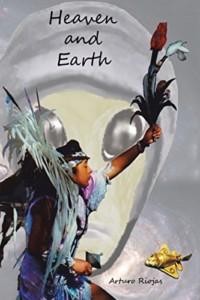Title: Heaven and Earth
Author: Arturo Riojas
Publisher: Xlibris
ISBN: 978-1-5245-4127-9
Pages: 398
Genre: Science Fiction, Allegory
Reviewed by: Jason Lulos
Pacific Book Review
Heaven and Earth is quite interesting allegorical sci-fi tale about the government- pharmaceutical complex. The cautionary commentary fuels the plot but is also offered to the reader for real life application. It is a novel/pamphlet about ancient aliens, cadmium poisoning and the cultural heritage of brainwashing the masses. Sounds calamitous but author Arturo Riojas cogently brings it all together.
Riojas aims to raise awareness about ubiquitous cadmium poisoning and has cleverly done so with parallel stories of rebellions on Earth and on an alien planet: Treretum. On Earth, among other environmental concerns, most are unaware of a poisonous amount of cadmium in the food supply. On Treretum, there is the similar microscopic “Muimdac” invasion. The warning is not just a matter of questioning what we eat. We must confront authority: those who control the food business and pharmaceutical companies which work hand in hand to perpetuate a corrupt system.
Aliens return to Earth to see how much their previous ancient visits have led to human progress. With them, an alien rebel faction has come to recover their comrades’ remains from Area 51. Olga and Gavilán are the main human protagonists. They are thoughtful, intelligent, open-minded, and this is why the alien rebels seek them out. In the process, they encourage Olga, Gavilán and their friends to seek the truth. Both aliens and humans must confront poisons (i. e. cadmium) and oppressive regimes of sorts. If you’ve never heard of the cadmium problem, you are probably not alone. This is the point – what don’t we know about what we eat and how we live? Riojas unveils these themes in alternating chapters of the story and scientific data on cadmium. He uses allegorical characters and motivations, thus comparing the Treretumian elites with a certain United States administration once infamous for cultural manipulation and wagging the dog. Like Animal Farm, it is fun decoding who the alien characters represent in real life: Egroeg and Yenech for example.
Thoughtful and well-written, it is an eye-opener about cadmium and a useful exercise in questioning authoritarian complexes. As literature, it is a bit exposition-heavy, but that is to drive the point home. The point: question what we are “fed” – what we eat but also the roles we are made to play. Riojas challenges the reader to ask – what are the causes of disease and what are the causes of how we think and live? Look for the causes rather than just the symptoms.


